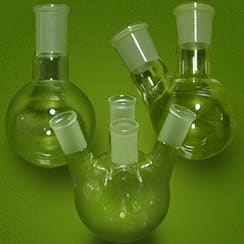
PCR
PCR Polymerase chain reaction or PCR is a technique developed by American biochemist Kary Mullis. This technique can amplify (make multiple copies of) a particular sequence of interest in a DNA. The first step in the process is the denaturation of the double-stranded DNA at a temperature of 94 to 96 degree Celsius. This is followed by annealing or joining of the specifically designed primer at the target site and then the action of polymerase leading to its elongation by the addition of the nucleotides from the nucleotide mixture added. The denaturation takes about 30 secs, the annealing about 20 to 40 secs and the elongation takes several minutes depending upon the number of cycles set in the PCR machine. 2n copies of DNA are made where n is the number of cycles. The annealing temperature usually varies between 50 to 65 degree Celsius whereas the elongation temperature on the average is 72 degree Celsius Requirement: PCR machine, the sample DNA template, a polymerase enzyme to initiate the polymerization of new strands (usually the heat resistant Taq polymerase is used), the designed forward and reverse primers that will bind to the sense and antisense strands of the sample DNA template, the deoxynucleoside triphosphates or dNTPs mixture which will provide the nucleotides for elongation - they act as the building blocks of the new strand, and the buffer solution to maintain the pH are the key requirements. PCR tubes are different and smaller from the regular Eppendorf tubes. The PCR reagents are heat sensitive and therefore stored in ice. PCR Kits are also available with everything readymade and quick to use. Types: In addition to the conventional PCR, a gradient PCR with a range of variation in annealing temperature can also be used. It is Ideal when samples are unknown. A digital PCR where the concentration of the targeted DNA is measured by diluting the sample and then running multiple PCR such that some don’t receive a single copy of the target DNA, this is used to negatively determine the concentration. Quantitative PCR (qPCR) which uses fluorescent dyes like Sybr Green to measure the quantity of amplified product in real time. Applications PCR has its application in confirming the presence of a gene. In DNA cloning and DNA fingerprinting experiments or quantitatively to estimate the level of gene expression amongst others.No Products


